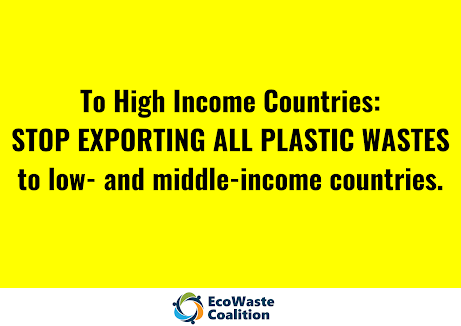New Study Exposes Hidden Toxic Plastic Waste Trade
Plastics are a mixture of fossil fuels and chemicals, and many chemicals in plastics are known to cause serious health problems. Exports of plastic wastes have been identified as a significant global health and environmental threat, but current reporting systems underestimate the volumes of plastic wastes that are traded globally.
To highlight the gaps in the current system for tracking the trade of plastic wastes, IPEN joined with researchers from the University of Gothenburg in Sweden, Cukurova University in Türkiye, and from the nonprofit The Last Beach Cleanup. Focusing on exports from Japan, the UK, the EU, and the US to non-OECD countries and Türkiye, the groups’ report, “Plastic Waste Trade: the Hidden Numbers“ highlights the large amounts of plastic waste exports that are often overlooked.
Looking at just two categories of plastic wastes that are overlooked by the current system, plastic wastes from textiles and from plastics in waste paper bales, the report finds that:
- Current systems miss as much as 1.8 mil tonnes of these two types of hidden plastic wastes.
- When hidden plastic wastes are counted, exports to non-OECD countries could be more than double.
- With hidden plastics counted, exports from the UK would increase by as much as 18 times. Exports from the EU are as much as 2.2 times higher, and from the US as much as 4.2 times higher.
- When tracking by the current system, Japan is the largest exporter of plastic waste; after adjusting for these hidden plastic wastes, the EU or US would be the largest exporter (depending on the range of estimates used).
“Our report demonstrates that we do not really know enough about how much plastic wastes are actually exported,” said Therese Karlsson, a Science and Technical Advisor with IPEN. “Plastic wastes contain toxic chemicals that contaminate the environment and threaten human health where they are dumped or burned. We need to significantly reduce plastics production or risk ongoing unequal and harmful plastic exports that endanger lives across the globe.”
Exported wastes are tracked under an international coding system, but the system does not track exports by the type of material being traded. Researchers often use this coding system to analyze the plastic waste trade, but the code designated for plastic wastes misses many of the ways that materials made from plastics are traded as wastes. For example, waste paper bales may contain as much as 30% plastics, but these are not counted under the current system. Additionally, exports of worn synthetic (plastic) clothing are not categorized as plastic waste, even though much of the clothing is unusable and is immediately dumped in landfills or burned.
There are also other categories of hidden plastics missed by current estimates: as much as 20% of electronic wastes are exported, and e-waste contains about 20% plastic, while less than 20% of e-waste is recycled. Rubber wastes, including the large category of used auto tires, are not included under the plastic waste trade code. Industry also hides plastic waste as refuse derived fuels (RDF), which are simply waste plastics that are re-purposed and exported.
Though they only account for 16 percent of the world’s population, high-income countries generate about 34 percent of the world’s waste. A large portion of wastes are plastics, which often contain toxic chemicals, and high-income countries frequently export plastic wastes to low- and middle-income countries that lack the infrastructure to manage them. Toxic chemicals from plastics contaminate air, water, land, and food chains at sites where plastic waste is dumped, landfilled, recycled, incinerated, and burned in the open.
"Many factors and actors affect the situation at the final destination when we talk about the plastics waste trade. Without vigorous regulatory enforcement on waste segregation and elimination of harmful chemicals, contaminants in plastic waste will continue to impact the receiving countries and pollute the communities,” said Yuyun Ismawati, Senior Advisor to Nexus3, an Indonesian public interest group. “Moreover, without disclosure of harmful chemicals in products, including e-waste and textiles, the contaminants hiding in the plastic waste trade will increase the burden of plastic pollution." A 2019 report by IPEN and Nexus 3 found impacts from plastic waste on Indonesia’s food chain.
Trends over the last decades show that the amounts of plastic wastes are increasing, the waste trade is increasing, and the trade of plastic wastes in categories that include plastics that contain very toxic chemicals, such as electrical and electronic wastes, are increasing. Between 2004 and 2021, the EU’s exports of wastes to non-EU countries increased by 77%.
As the production of plastics increases, plastic wastes will also skyrocket. Estimates show we will produce 26 billion tonnes of plastic waste by 2050. As the groups’ report notes, “(W)ithout global policies to reduce plastics production, there will continue to be an unequal exchange of plastic wastes from high income countries to non-high-income countries…. To develop sustainable waste management practices for the future, the production of plastics needs to decrease, and plastics should only be used when they are essential for the functioning of society.”
“While it was vital that the Basel Convention began to recognize and control trade in plastic wastes in 2021, it makes no sense to only open one eye to the problem and only address what is very obviously labelled as shipments of “plastic waste.” Meanwhile we fail to recognize and control the less obvious plastic waste trade moves from North to South. Textile waste exports are plastic, tire waste is plastic, refuse derived fuel is largely plastic, and so too are the plastics mixed in paper bales which are routinely exported from developed countries, only to be dumped and burned outside of the pulp mills in Asia. It is time for governments to quantify and address the entire scope of global plastic waste dumping hiding from regulators in plain sight,” said Jim Puckett, Executive Director of the Basel Action Network (BAN), a nonprofit working to end toxic trade for global environmental health and justice.






Comments